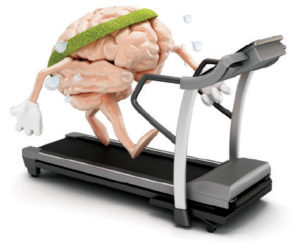Is there such a thing as a perfect brain?
 Or does everyone have a “messed up” one?Isn’t it true that everyone needs Neurotherapy or brain training? The answer to each of these questions is “NO”. So, who needs brain training, what is it, and how can it help me?
Or does everyone have a “messed up” one?Isn’t it true that everyone needs Neurotherapy or brain training? The answer to each of these questions is “NO”. So, who needs brain training, what is it, and how can it help me?
To answer these questions, we need to know a little bit about what’s going on inside your head. Your brain is comprised of billions of neurons making trillions of neural connections that combine in patterns. These patterns shift and change throughout the day to respond to our functioning. When we are sleeping, we have the same amount of neurons firing as when we are awake, however, the pattern of these connections will shift to be slower to allow us to close our eyes and drift off into slumber. As we are awoken from sleep, the patterns will shift into a more awake and then fully alert pattern. This process of shifting, changing, and firing happens automatically and unbeknownst to us. It’s only when there is a disruption in this pattern, when the pattern is off balance or if the brain cannot shift appropriately, that we now have a problem.
What do these problems look like? Here are a few examples…
Trouble falling asleep, staying asleep, waking up.
Anxiety, increased stress, panic attacks, worrying, fears
Trouble with focus and concentration, daydreaming, hyperactive
Inability to be organized, motivated, have good time management
Headaches, migraines, chronic pain
Fatigue or energy levels, over activated or busy brain
Obsessive thinking, cognitive issues, memory issues
Difficulty with social interactions, attachment, relationships
Depression, low mood, irritability, anger
Deficits from stroke, concussion, head injury, surgery, seizures
Symptoms from Lyme, Candida, PANDAS, Autism Spectrum
Learning problems, trouble with processing, sensory sensitivity
Oppositional defiant, behavioral problems, mood swings and Bipolar.
When we look at the brain’s neural patterns through imaging such as a Quantitative EEG, we may see the imbalance of neuron firing patterns and possibly even a disruption in connections, however, these findings may not indicate a disruption in functioning. This means that not everyone needs or would notice a difference with brain training. During a consultation, intake or at the beginning of treatment, our experienced Neurofeedback therapists can help determine if you do, in fact, need brain training, and if you will notice results or positive changes in functioning. This is not a guarantee that your expectations are going to match the changes your brain decides to make. But it does mean that with proper assessment and treatment, you will notice changes in functioning.
What if I want to just be better at my job, school, sport, or in general? Would brain training help me with that? The answer is, of course yes, brain training or more appropriately described as brain strengthening, can be utilized by anyone or everyone. We call it Peak Performance Training and it’s been used worldwide for many years. The Italian Soccer National Team used a “Mind Room” that combined biofeedback and Neurofeedback to optimize performance of players in preparation of the 2006 World Cup that they subsequently won.
WHAT IS BRAIN TRAINING OR NEUROFEEDBACK?
Neurofeedback, also known as EEG biofeedback, or brain training has been studied and practiced since the late 60’s. It is exercise for your brain; allowing you to see the frequencies produced by different parts of your brain in real-time and then through visual and auditory feedback, teaches the brain to better regulate itself. Neurofeedback can be used to help detect, stimulate, and/or inhibit activity in the brain safely and without medication. It can help restore a wider “range of motion” in brain states, much like physical therapy does for the body.
While the client sits comfortably watching a movie or pictures appear on the screen (a calm and focused state), the EEG equipment measures the frequency or speed at which electrical activity moves in the areas where electrodes have been placed. This information is sent to the therapist’s computer. The therapist is then able to determine what frequencies are out of balance. For example, when the EEG shows that you are making too many “slow” or “sleepy” waves (delta/theta) or too many “fast” waves (high beta), the therapist adjusts a reward band to encourage more balanced activity. This encouragement or “reward” happens through an auditory reinforcement of “beeps” and sometimes through visual reinforcement of changes on the screen.
WHAT IS A QEEG (QUANTITATIVE EEG) OR BRAIN MAP AND DO I NEED ONE?
The QEEG is a quantitative EEG. It’s also called a brain map and does just that…it gives us a map of what is going on with the entire brain at one time. We attach electrodes to the whole head, 19 spots, and then record the brain waves with eyes open for 5 minutes and with eyes closed for 10 minutes. This recording is then sent to an independent specialist be read and analyzed. They can not only give us a summary of significant findings, but the report also shows the results of analyzing the data several different ways. The brain activity is not only compared spot by spot over the entire head, but we can also look at connections, symmetry, how different parts are communicating, and all this data is compared to a database of peers (same sex, handedness and age). It can help us see what areas need to be addressed more efficiently than just training spot by spot.
We don’t always need this data to make improvements in symptoms, but we do recommend it in certain situations. A QEEG can also be helpful information when diagnosing and/or trying to decide the best medication/supplement recommendations.
WILL BRAIN TRAINING
WORK IF I AM TAKING MEDICATION?
Yes, we recommend that you continue the medication regimen that you and your physician have established. Your brain will learn new patterns even if medication is present. We are even able to help you and your physician determine the best course of medication based on Diagnostic findings and EEG brain patterns.
As your brain begins to work more efficiently, medications also work better. For those who cannot take or are only marginally responsive to medication, neurofeedback can offer an alternative or supportive role to drug therapy by stimulating or inhibiting brain activity at the same basic neurological level as medication. Eventually with training, many people find they are able to reduce the dosages or cease taking some prescription drugs, but only after careful consultation and planning with the prescribing physician. For this reason, neurofeedback practitioners advocate consistent communication between clients and their physicians during training and encourage discussion of their neurofeedback experience with therapists and doctors so accommodations can be made as training progresses.
WHAT’S THE PROCESS
FOR GETTING STARTED?
As each one of us is a different and unique individual, we also have different and unique brains. Because of this, we tailor treatment to the individual. When you come into our office for a consultation or to begin treatment, we will assess: Is brain training appropriate for you and your goals? What is the best treatment plan for to achieve those goals? Are other modalities and/or diagnostics really necessary? And what is the best timing if they are needed? And we will also make a determination about how often you should have training. Once we begin treatment we may make adjustments to this treatment plan.
Getting started is easy, just give us a call. The Brain and Wellness Center staff will answer all your questions, and help you get scheduled. We can schedule you for an intake, a telephone consultation, or a face to face consultation and see our facility. Call, email or message us today! Brain and Wellness Center, 7301 W. Palmetto Park Rd., Suite 102A, Boca Raton, FL 33433. (561) 206-2706,
e-mail us at info@bocabraincenter.com, or text us at (561) 206-2706 or visit our website at
www.BocaBrainCenter.com.
Renee Chillcott, LMHC
Renee Chillcott is a Licensed Mental Health Counselor that has been practicing Neurofeedback training since 2005. Renee holds a BA degree from The University of Central Florida and a Master’s Degree in Psychology from Nova Southeastern University. She is a Licensed Mental HealthCounselor and is the owner/operator of The Brain and Wellness Center, located in Boca Raton. At The Brain and Wellness Center, adults, teens, children and families enjoy a variety of services from multiple providers. Neurofeedback, Brain Mapping, Acupuncture, Nutritional Counseling, Learning Programs, and counseling are among a few of the services offered.
Check Also
The Mighty Maestro: Bob “Mighty Mite” Toski’s Enduring Legacy at 98
In the warm glow of a spring evening in Delray Beach, Florida, a remarkable celebration …
 South Florida Health and Wellness Magazine Health and Wellness Articles
South Florida Health and Wellness Magazine Health and Wellness Articles




